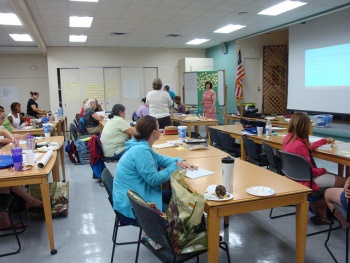Using the feedback
| Foundation Skills | |
|---|---|
| Lecturer self-evaluation | |
| Gathering student feedback | Objectives | Methods for gathering student feedback | Using the feedback | Summary |
How you respond to the feedback from students, depends on the type of feedback you have gathered. Either way, to become a reflective practitioner, it is essential that you also 'sit with the feedback' and reflect on it; thus putting the concepts of self-evaluation and reflection (mentioned previously in this unit) into practice. The outcomes of this reflective process could be:
- emotional engagement with the information - how did you feel about the students' responses or the evaluation results?
- greater awareness about your teaching performance and effectiveness of your strategies - what have you learned? What was done well, and what could be improved?
- insights about the students' learning experiences - do they understand the subject concepts, is the learning environment adequate? Are they engaging satisfactorily?
- ideas and decisions about doing things differently - what goals have you established for changing your practice?
Changes could be small and enacted immediately, or they may require further thought and development. Regardless, it is important to communicate the outcomes to your students as soon as possible so that their perspectives and opinions are seen as important.
- Informal feedback
needs to be acted on immediately, otherwise what is the point in gathering it? The whole idea of obtaining this type of feedback during the course is so that a teacher can respond and make changes straight away. Once you have reflected on the feedback, and perhaps discussed solutions with a mentor, let the students know the outcome, and explain any changes you are going to make. Try and be upbeat, and positive when responding to them, even if some of their feedback is confusing or negative. Always ask the class for further clarification, if you are unsure what they have suggested, and allow them to respond anonymously.
- Formal feedback
Once you obtain evaluation results about your teaching, or about the courses you teach, it is important to do something with the information. This sounds obvious, perhaps, but how many people do you know who have received results of student evaluation surveys, and only smiled or grumbled about them? So what should you do? Perhaps you plan to talk about it with peers, or your mentor, or with a manager during a performance review?
As mentioned, it is best to undertake self-reflection and critical analysis first. Some good resources for aiding your reflective process are listed.
|
Reflective writing guide
Available from: http://www.exeter.ac.uk/fch/work-experience/reflective-writing-guidance.pdf Books All the following books are available in the Robertson library in hard copy and some as e‐books.
Publications Ltd.
Open University Press.
Routledge Falmer.
|
